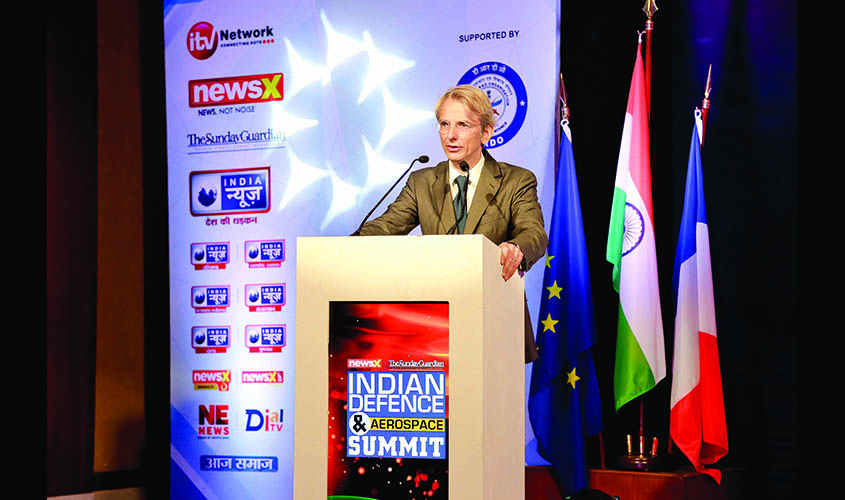That explains France’s steadfast support for India’s bid for a permanent seat on the UNSC, says French Ambassador to India Emmanuel Lenain.
NEW DELHI: The changing geopolitical context, both at the international and regional levels, has enhanced the strategic nature of the Indo-French partnership. The developments have helped the two countries realise that they have more in common than was anticipated.
This was stated by French Ambassador to India A.M.B. Emmanuel Lenain, during the “Indian Defence & Aerospace Summit”, organised by the “NewsX” channel and The Sunday Guardian (iTV Network), here on Saturday. He said: “As the Indo-Pacific space started undergoing reconfiguration, we realised that India and France had commonalities not only because both belong to this region, but also because of their security and economic interests. I can tell you that enhancing the Indo-Pacific partnership will be at the heart of my mission in India.”
“Because, above all, we share the same vision for this region: the guarantee of freedom and safety of navigation, stability through the emergence of a multi-polar order, prosperity through sustainable development projects,” the French Ambassador said.
Recalling the foundation of this partnership, he said: “It was, in fact, in the areas of defence and aerospace that we began to build this relationship of trust, immediately after India became an Independent and sovereign nation. As early as 1953, India signed its first contract with Dassault Aviation for around 70 Ouragan fighter planes, renamed “Toofani” by the Indian Air Force. These were soon followed by the Mystère IV, the naval Alizé, the Jaguar, the Mirage 2000 in the 1980s, and, most recently, the Rafale. Similar cooperation involving production in India was developed in the 1960s on light helicopters, radars, anti-tank missiles and other defence and aerospace technologies.”
Our strategic partnership, he said, has grown to enable the two countries to better understand new threats—combatting terrorism, maritime security and cyberspace. “All these areas have their dedicated dialogues at an appropriate level, which allows for an operational review of the cooperation,” he said.
“This strategic partnership has a vision. Most of our cooperation (terrorism, maritime and space security, cyberspace and digital technology) are now framed by joint statements that recognise the converging interests of our two countries and chart out the course we want to follow together. This strategic partnership has provided excellent foundations for our bilateral relations, which are solid and marked by trust. This is what explains our steadfast support for India’s bid for a permanent seat on the UN Security Council,” he added.
Stressing the need for the strategic partnership to evolve, he said the two countries can further deepen and build on our excellent cooperation in the field of maritime safety. “We exchange monitoring data as part of our agreements, we share interpretations (and we are delighted as such that the French liaison officer will soon join his post at IFC-IOR), we are even building capacity with the ongoing project of CNES and ISRO on a constellation of satellites for maritime surveillance,” he said.
Stressing the need to increase exchanges on cyber defence and space defence, he said the two countries share their threat assessment and their response options to move towards a coordinated strategy. “Our two countries are engaged in a process of reflection and structuring of their stance on these issues: this is precisely the moment when we have to open up a dialogue and seek common courses of action. This year’s restart of the UN process to promote stability and security in cyberspace gives us a platform to accent its benefits,” he added.
Regardless of the stakes, adherence to the “old” values that characterise our two democracies, including the protection of individual freedoms and respect for the rule of law, should be our guide when we look for answers to “new” challenges–as in cyberspace—or renewed challenges, as in the fight against terrorism, the French Ambassador said.




